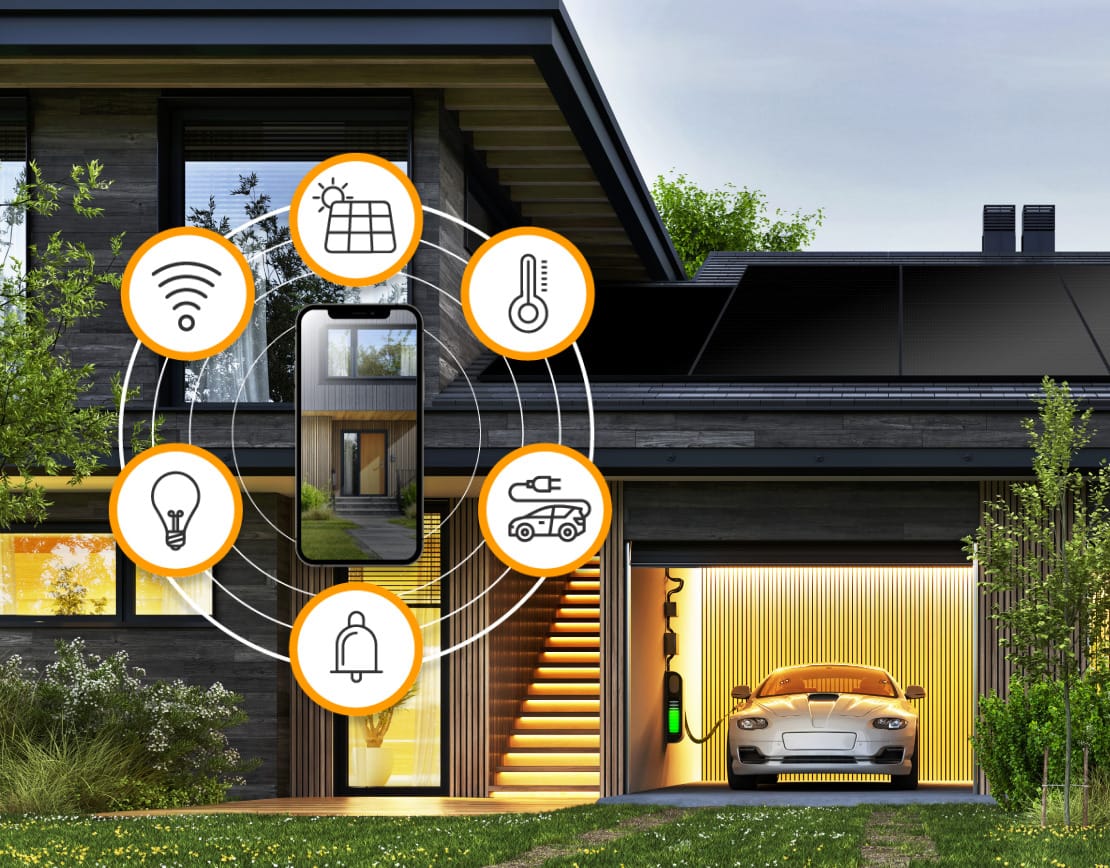The conversation about Smart Homes may be familiar to some, but as the integration of new technology is rarely instantaneous, it’s worth exploring what a Smart Home is and how best to think about approaching your own Smart Home project. If you're interested in receiving guidance on creating your own solar powered Smart Home, we offer free consultations with our energy specialists.
As you consider the various components that will comprise your perfect Smart Home, don’t forget to account for the energy usage of each element you bring together. Especially as your usage increases seasonally, you'll want to be prepared to control the heating of your home in winter, and the cooling of your home in summer!
Taken as a whole, an IoT (Internet of Things) capable Smart Home requires a lot of power to operate, and where that energy comes from should be part of the conversation. If we want to achieve a sustainable model for the Smart Home, it’s time to bring solar power to the table. Let’s take a look at some of the most common elements of a Smart Home, and begin to think about how we can make them all work together, cleanly and efficiently.
What is a Smart Home?
So what exactly is a Smart Home? Generally speaking, the concept of a Smart Home is a house filled with appliances and products that are designed with comfort, connectivity, and control in mind. These items should perform a useful function, but also provide value to the homeowner through access to data insights and control over functionality.
We’ve come a long way from home novelties like the clapper, and in the modern Smart Home you can control many aspects of your appliances through your phone or voice.
With some smart consideration as to the setup of your systems, your home can integrate new pieces of technology seamlessly, and allow them to work in concert to make your life easier and more convenient. There are many different elements to consider when swapping out your current setup for smart appliances, as there are many companies that have invested into this technology.
You’ll have to decide which pieces play well together, and construct a system from the best possible parts. The process of assembling a top tier Smart Home is not unlike that of designing a top tier residential solar system, but we’ll discuss how to bring these elements together shortly. For now, let’s talk about tech.
Smart Home Standards
Some of you will read this guide and already be familiar with many of the Smart Home basics, but before we talk about the place of solar energy in the modern Smart Home, we wanted to establish a level playing field for understanding Smart Home technology.
There are so many pieces of technology that you can fold into a total Smart Home package that it’s almost daunting to know where to start. However, that’s where we come in! In this guide, we will go room by room and take a look at the best upgrades for your Smart Home. Whether you’re an early tech adopter or a more reserved consumer, we’ll lay out the products and services that will most benefit your Smart Home journey.
Smart Hubs
Let’s begin with the Smart Home hub, like Apple Home or Alexa, an item that will serve as the control center for many of your new tech acquisitions. Not every device will be able to link to a Smart Home hub, but many in the industry are pushing towards a standardized language for all Smart Home tech, which would make it easier to sync up and control all devices within a system.
For now, a Smart Home hub is a great way to establish the feel of your Smart Home system, with integrated and connected technology governed by voice control. You’ll be able to give commands to other devices in your network, and ask questions of an internet connected AI system which can provide you with answers.
Smart Services
Next up, you’re going to want some strong, service oriented devices to really establish the value of your system. Things like a smart thermostat are particularly important to us, because they allow you to conserve energy while empowering you to control your environment and maintain an increased level of comfort. Precision control allows you to set and monitor your temperature, and save money on heating and cooling in the process. You can even turn the system on and off from anywhere as long as you have an internet connection, so you’ll never accidentally leave the heater on and running all day.
In line with the energy saving nature of a smart thermostat, there are many smart & eco-friendly devices you can install throughout your home, from internet connected devices like a smart refrigerator to less intelligent but more energy efficient appliances like electric stovetops and washer-dryers. Many of these devices are becoming more advanced by the day, with touch screen bulletin boards and fingerprint locks, and whether or not they integrate into your smart hub, they’ll still conserve energy and save you money, which is in line with our philosophy.
Smart Specialties
After considering these larger appliances, let’s take a look at some fun, interesting, and useful applications of Smart Home tech. Two of the most popular smart devices for most consumers are smart lights and smart speakers. Smart lights are a simple concept, but in practice they are an impactful element of a Smart Home.
Not only will smart lights enable you to save energy by controlling when your lights are in use, but with many products on the market you’ll be able to set the specific color palette for every room in your home. If you’ve never had smart lighting in your house, there is just something about being able to change the color of every light in every room to fit whatever mood you’re in, that really sells the dream of a Smart Home. It’s comfort, conservation, and control, all from one easy to use package.
Smart speakers fulfill a similar dream, to communicate with your digital assistant throughout your home, and to be able to summon music from thin air. A good set of smart speakers will be able to integrate with your smart hub and other devices to provide you clear audio quality where you want it. Why pour through your phone looking for a song when you can just speak a wake word and ask for the song you want to hear?
Smart Upgrades
Finally, there are a few upgrades you can make that will highlight your comfort, convenience, and control goals. First up is a smart tv, which will allow you to bring together multiple digital services into one integrated package. A far cry from the CRTV, smart TVs are thin, light, energy efficient, and internet connected, making your dream of Smart Home integration even easier.
Add to that the next item, a smart router. Not only are smart mesh networks faster, more secure, and more reliable than traditional routers, but they provide you more insight into and control over how your devices use the internet. This functionality is especially important for families, as monitoring internet usage is a growing interest.
Last but not least, there’s a clever new way to give any device “smart” capabilities, even if it isn’t natively a smart device. Smart plugs allow you to put a control point between a device and your energy source, and enable you to add activation functionality like app and voice control to any item you want! It’s a great way to both control your usage and conserve energy.

A Smarter Energy Solution
So, we’ve outlined the goal of a Smart Home, and discussed some of the must-have devices that you can incorporate into your system to give you the best and most useful functionality possible. Now it’s time to talk about how we intend to power all this tech. Every accepted or adopted smart home technology requires power & connectivity to elevate itself above the station of unconnected items. You can’t very well have a Smart Home without power, so where is that power coming from? It’s time to start incorporating solar energy into the design of a modern Smart Home.
Solar fits perfectly with the established goals of a Smart Home, providing a user with insight into their energy usage and control over their energy production. It also dovetails nicely with the goals of many Smart Home devices, which seek to conserve energy and reduce waste. If you thought a smart thermostat or smart plug were great energy conservation options, just wait until you see what solar can do!
A solar system can also be expanded in several interesting ways, allowing for greater Smart Home support. With the inclusion of elements like solar battery storage and smart hubs, you can create a system that best serves your technological needs and environmental goals. With applications like SolarEdge, you can monitor your solar system and track the efficacy of your panels and their environmental impact. With a smart hub like SPAN, you can truly achieve the promise of a smart home by aggregating the monitoring and control of all your energy systems into one app. You can monitor not just the production of energy at your house, but also how that energy is allocated. By lending functionality to these systems, and providing opportunities for increased efficiency, you can make your energy production an integral part of the overall smart home ecosystem.
Beyond even that level of control and customization, battery systems allow you to store energy for when you need it, such as during peak pricing hours and in the event of an outage or emergency situation. With all of these systems in place, you’ll be able to decide which segments of your house are powered, and prioritize anything that you’ve flagged as necessary.
So let’s break down some of these key elements, and understand how you can build out a solar system, and gain value for your Smart Home.
The Power of Solar
A solar system provides clean, renewable, accessible energy to a modern Smart Home. As we mentioned earlier, a Smart Home requires power and connectivity, and even if every one of your new devices is conservation minded and consumption reduced, you still need power to make it all work.
Access to power is a key differentiating factor between the analog systems of old and more modern smart devices, and with solar, you have control over how that energy is produced and used. Many people turn to smart tech to help them make a positive environmental impact by reducing energy consumption, but if you’re still primarily relying on grid power, then that energy isn’t clean. Solar is a clean, renewable energy source, and a solar system empowers you to take energy generation into your own hands.
There are ways to take this even further, with battery storage systems. By storing the energy you produce with your system in an on-site battery, you can further reduce the amount of grid energy you rely on, which saves you money and saves the environment at the same time. Further complimenting your system with monitoring apps and smart circuit boards means you can control which systems in your house are allowed to draw power from the battery storage and when.
This is incredible for daily usage, but becomes potentially life saving in the event of an outage or emergency. Instead of being without power or draining the battery immediately, you can decide which devices are powered and when, allowing you to safeguard your energy stores and decide when and how that energy is used.
A solar system enables you to save money as you power your devices, and gain more insight into how you use power in your home. You can take control of which devices use power when, and with a battery system, which components of your smart home are essential in the event of an emergency or an outage. That’s the power of solar - now let’s talk about the value.
The Value of Solar
When it comes to Smart Home tech, solar has one distinct advantage over the rest of your setup - it’s the only component that pays for itself! As you generate solar energy and save on your monthly energy bill, you’ll watch as the savings pay off the system over time. Simply Solar can help you calculate this payback period, and once that period is over, all your energy bill savings become direct value - money you saved beyond the cost of the system. California’s Net Energy Metering allows you to further utilize the energy you generate by selling it back to the electric company, further offsetting the cost of your total electric bill.
The value of solar doesn’t stop there - there are tax credits for going solar that make the switch even more appealing. The Solar Investment Tax Credit, or ITC, allows you to deduct a percentage of the total cost of your system from your federal taxes, and while this percentage is set to decrease in 2023, it’s always a good time to take advantage of the tax credit. Clean, renewable energy is the way forward for the world, and anything that helps you make the upgrade to a solar Smart Home is a plus in our books.
There is another valuable benefit to going solar that is often overlooked or underestimated, and that’s the increase in property value from a solar installation. Solar panels are an upgrade to your residence, just like a renovated kitchen or finished basement. They take effort and investment to put in, so naturally they increase the total value of your residence as a result! Especially in California where the energy code is pushing towards total adoption of solar, installing a system on your residence is a great way to increase the value of your home.
Solar energy can cover the cost of your electric bill, earn you tax credits to cover the cost of installation, and even increase the value of your home. It’s one of the only elements of a Smart Home that actually adds tangible value to your property, and it pays for itself over time through usage of the system! Now that’s smart.
Elements of a Solar Energy Upgrade
So, now that we’ve shown you how solar fits into the ideal Smart Home setup, let’s talk about what you need to get up and running. The first thing you’ll need to do is pick a trusted solar installer, and wouldn’t you know it, we have a guide for that as well. Once you’ve found an installer that is right for you and your project, you can move on to designing a system that fits your energy needs. Be sure to tell your consultant all about the new smart devices you’ve acquired, the EV charging station you just had installed, and the new spa style pool you had put in recently. All of this will total up to your specific energy needs, and your consultant will be able to customize a system that works best for you.
One thing to keep in mind as you design your new system is battery storage. We discussed a moment ago how battery storage can help you increase the value of your solar system, but let’s talk about making our Smart Home Smarter. For most people, the inconvenience of having no lights in a power outage is enough to consider a battery, as is the potential for spoiled groceries in the fridge. But for some, loss of power is a more serious problem.
For those who get their water from wells run on electric pumps, or for anyone who relies on electricity to power their medical devices, loss of power from an emergency or outage is dangerous. With the risk of fire season never far from top of mind for most Californians, the smart choice is to be prepared - and battery storage is the next step towards preparedness.

Simply Solar - Smart Power for Your Home
Designing your perfect Smart Home is no small feat, but when it comes to your smart power solution, we offer solar made simple. Solar power is a critical component of the modern Smart Home, and it offers more value and clean energy impact than any other element of your smart network. To learn more about making solar power a part of your Smart Home project, contact one of our experts today.





